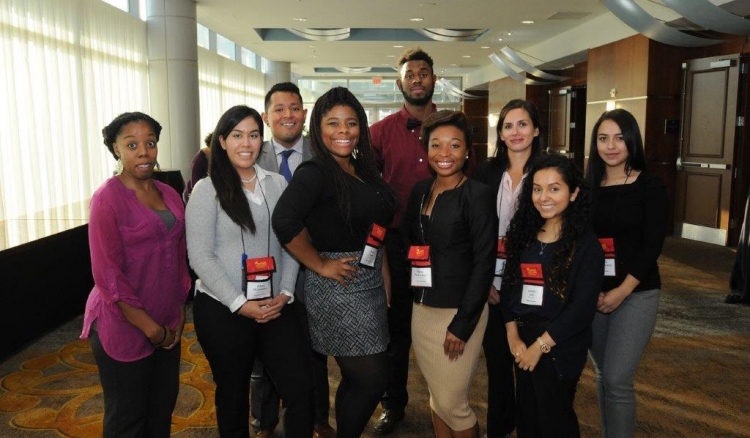 Last year, DePaul's 2016-17 McNair program cohort traveled to the annual McNair Scholars Conference at the University of Maryland, Baltimore County. (DePaul University/Darryl Arrington)
Last year, DePaul's 2016-17 McNair program cohort traveled to the annual McNair Scholars Conference at the University of Maryland, Baltimore County. (DePaul University/Darryl Arrington)
After completing a highly rigorous and competitive renewal process, this fall the Center for Access and Attainment at DePaul received funding for its fourth cycle of the
Ronald. E. McNair Post-baccalaureate Achievement program. This funding, provided by the U.S. Department of Education, will last through 2022.
"We are thrilled to receive funding for the next cycle of the McNair program," says Darryl Arrington, the assistant vice president for Center for Access and Attainment, which houses the program. "This initiative has helped increase the number of under-represented students in both post-graduate programs and the professoriate."
Named by the Department of Education in honor of Ronald E. McNair, an astronaut, engineer and scientist, the McNair program encourages minority, low-income and first-generation college students to expand their educational opportunities and pursue graduate studies. Established at DePaul in 1999, the university is one of only 151 institutions across the United States to have a McNair program.
"Historically, the DePaul graduation rate for McNair participants has been 100 percent," Arrington says. "Over the last five years, at least 70 percent of our participants immediately enrolled in graduate programs. With this next grant installment, DePaul can continue to assist under-represented students in successfully pursuing graduate studies, earning doctorate degrees and becoming professors."
To complement the McNair program, DePaul created the
Arnold Mitchem Fellows program in 2011. Similar to the McNair program, the initiative aims to prepare undergraduate students from under-represented populations for post-graduate study. However, the Mitchem Fellows extends the McNair program's capacity by serving two categories of students not eligible for McNair: those who do not meet TRiO's income and first-generation status eligibility criteria; and those who aspire to academic careers in medicine and other STEM fields where the Ph.D. may not be the final degree. Together the McNair and Mitchem programs serve 60 students per year.
"Our approach represents the best of what federal funds and programs ought to do," says David Kalsbeek, senior vice president for Enrollment Management and Marketing. "We studied and learned from the initial grant-funded program, then with our own funding launched the Mitchem Fellows to reach even more under-represented students."
The Mitchem Fellows program is named after Arnold L. Mitchem, president emeritus of the Council for Opportunity in Education, who spent his career advocating for low-income and first-generation students, and individuals with disabilities. DePaul is one of several universities in the United States to offer fellowships named after Mitchem to encourage both opportunity and achievement in higher education.
"It's an honor to be part of the McNair community and to also operate an expanded version of the program from our own funds," Kalsbeek says. "This grant will help DePaul continue to immerse students in specialized curricula and activities that will develop their knowledge and skills, and foster the commitment needed to pursue doctoral studies and careers in university-level teaching and research."